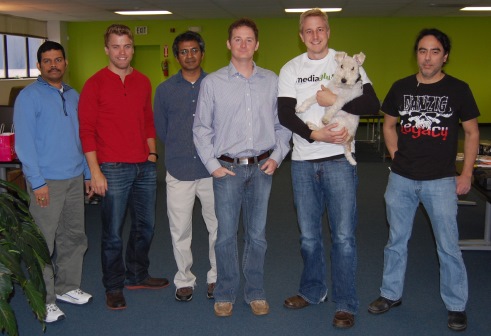Justin Musterman is entirely taken by the industrial fringes of Pigtown, the neighborhood where the CEO and cofounder of mediaglu has his offices. Others are too and so, there are unique intersections.
At the corners of Bush and Wicomico Streets also sit headquarters for sporting goods giant STX and 125 year-old Ellicott Dredges. Blackboard-owned edtech shop Moodlerooms is close by.
“We had the energy minister of Nigeria in our parking lot the other day because he was coming to negotiate a deal with Ellicott Dredges,” said Musterman, 32. “Military police everywhere, right here.”

Musterman and his company are all about being in the center of great amounts of commerce. As one of Baltimore’s up and coming additions to the city’s burgeoning ad tech community, mediaglu was founded in late 2009 by a core of ad tech veterans who came out of Advertising.com.
Musterman, Sundar Nathikudi and a third cofounder met and together left after the Aol acquisition. Taking their last names — Musterman, Lyles, Nathikudi — they formed MLN Advertising, as a digital consultancy. As they built out tech offerings that other agencies could use, they launched mediaglu as a separate brand, though it remains part of the MLN family.
With backgrounds in the growing science of digital advertising and data analytics, Musterman and his team at mediaglu are hard at work pushing the boundaries of ad tech to help brands target better the right consumer with the right message at the right time.
For mediaglu, Musterman’s strategy is to partner with ad tech agencies, who create and place ads for brands, and give them specialized intelligence derived from ad views a consumer makes across connected devices, such as desktops, tablets and smartphones. Drawing on their experience analyzing consumer-driven ad data, the mediaglu team has developed their own method to enable digital advertisers to leverage “intent-driven advertising” – the targeting of digital ads to consumers who indicate some readiness to purchase in their online searching.
At its core, mediaglu’s value proposition is its proprietary algorithm — they’re considering patent protection — tying together the “disparate silos of digital media buying at the device level,” as Musterman puts it.
“What we do is break down the walls of those silos and start to divine out where do each of these fall into the marketing funnel and how can I connect the dots to more efficiently push a user through that path,” Musterman said.
From its start, mediaglu has brought in revenue. The company bootstrapped its early growth by luring a base of customers out of Advertising.com. And in each of the last three quarters (including the current quarter), mediaglu has posted 100 percent revenue growth, he said. Musterman also said mediaglu has integrated with its first ad tech partner with a goal to bring in seven by the end of this year.
With seven full time employees and two contract sales people, Musterman said he’s considering raising capital at some point to facilitate growth. His priority for now, though, is to charge ahead on developing partnerships with other ad tech companies to help brands optimize their digital advertising.
“We’ve primarily worked with brands either through their agency or occasionally directly if they don’t have an agency, but that’s shifting. From a business development standpoint, that’s a real tough slog breaking into agencies and breaking into brands and getting them to connect,” Musterman said.
“What we want to do is to be able to scale is power the connection of devices, the gluing of those devices,” Musterman said. “We’ll power the attribution and the reporting around digital ads. And our partners can worry about selling it to the end client and the media buying.”
Musterman, to be sure, is proud of his company’s Baltimore and Maryland roots. As first time entrepreneurs, he and his cofounder ran mediaglu out of his townhouse in Canton before moving to their current office just under two years ago.
An Annapolis native, Musterman started at Loyola University Maryland for one year on scholarship and later matriculated at the University of Baltimore.
“I started as a computer science major and then I switched to finance as a junior and so I ended up finishing with a finance degree.” Says Musterman. “I still use a lot of that computer science knowledge. I can write in VB, I can write in C++, I can write in SAS and in SQL, and I can still think in object-oriented programming and database languages if I have to. I don’t do that day to day, but I think from contributing to the product development, I have the ability to know what’s possible and what’s doable,” he said.
mediaglu: target customers with adtech offering from MLN Advertising







